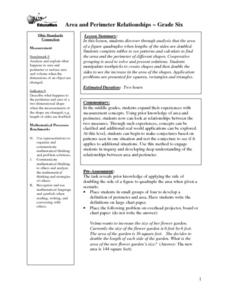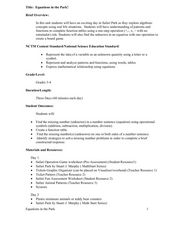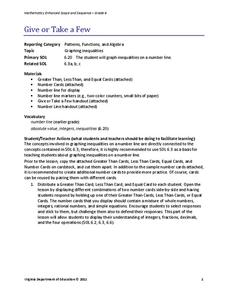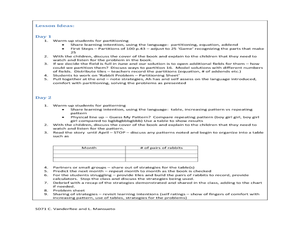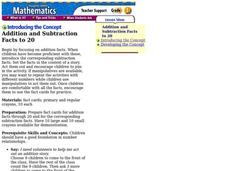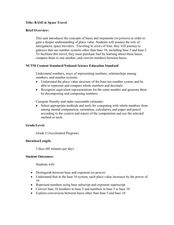Curated OER
Himalayan Herds: Fractional Exponential Growth
Young scholars solve problems by identifying exponential growth and decay and differentiating between patterns, relation and functions. For this algebra lesson, students apply concepts of exponential growth to solve problems.
Curated OER
Discovering Growth Patterns
Students explain the differences between linear (arithmetic) and exponential (geometric) growth. They use worksheets imbedded in this lesson to help them make predicitions and graph data points.
Curated OER
Transportation Math
Sixth graders solve transportation themed word problems. For this word problem lesson, 6th graders solve transportation themed word problems using critical thinking skills.
Curated OER
Area and Perimeter Relationships
Sixth graders explore the relationship between area and perimeter. After discovering the definition of perimeter, 6th graders work together to create designs for a flower bed. They observe that the perimeter remains constant even...
Curated OER
Slopey Math
Students identify the slope of a line and use it to solve real life problems. In this algebra lesson, students write linear equations in slope intercept form and make a correlation to its relation to the real world. They use the slope an...
Curated OER
Variables and Patterns: Determining an appropriate scale while graphing
Sixth graders determine appropriate scales when graphing data. In this graphing lesson, 6th graders use an the applet "Graph It" to determine what is an appropriate scale for their data.
Curated OER
Equations in the Park
Learners explore algebraic concepts using real life situations. For this equations lesson, students develop strategies to solve missing number problems. Learners participate in a board game based on algebraic equations.
Curated OER
Cantilevers
Students perform an experiment to find the linear relationship between the appllied weight and the bend of the cantilever. In this linear relationships instructional activity, students follow detailed directions to set up an experiment....
Virginia Department of Education
Matching Representations
Pupils explore the many representations of linear functions by completing a matching activity to connect the multiple representations of a function. They then reinforce the connection as individuals create the different representations...
Virginia Department of Education
Give or Take a Few
Young mathematicians extend their knowledge of rational numbers on a number line to graph inequalities by first using number cards to compare rational numbers. They finish by using similar reasoning to graph inequalities on a number line.
Curated OER
The Rabbit Problem
Young scholars notice a number pattern in the book The Rabbit Problem by Emily Gravett. In this number pattern lesson, students represent and describe numbers appropriate to their grade level.
Curated OER
Using Square Tiles to Investigate Numbers
Fifth graders model and distinguish between prime and composite numbers. Students are paired up with another classmate to complete this instructional activity. Students are assigned different numbers to work with, they use square tiles...
Curated OER
Sort it Out
Students identify and sort a variety of two- and three-dimensional objects and compare and contrast their attributes. They identify shapes, locate shapes on the faces of solids, sort real objects and explain the sorting rule, and...
Curated OER
Number: Fractions
Students explore equivalencies. In this decimals and fractions lesson, students examine number relationships and patterns as they compare whole numbers to decimals. Students complete a worksheet that requires them to convert...
Curated OER
Problem Solvers
Fifth and sixth graders compare decimals to the place-value structure in the base-ten number system. They represent fractions as parts of unit wholes, as parts of a set, as locations on a number line, and as divisions of whole numbers....
Houghton Mifflin Harcourt
Addition and Subtraction Facts to 20
First graders act out number stories from number cards. In order to learn about addition and subtraction up to 20 lesson, learners become the manipulatives and line up to show the number stories.
Curated OER
An Introduction to Sequences
Fourth graders are introduced to arithmetic and geometric sequences. In this mathematics lesson, 4th graders produce a variety of sequences by varying the starting number, multiplier, and the add-on number.
Curated OER
Metric Meals
Sixth graders investigate metric measurements. In this metric measurement lesson, 6th graders explore mass, capacity, and length. Students examine graduated cylinders and balance scales to obtain measurements. Resources are provided.
Curated OER
Linear Relations
In this linear relations worksheet, students complete a table for given functions. They classify graphs as linear or non-linear. Students graph given equations. They compare and contrast graphs. This nine page worksheet contains five...
Curated OER
Tower of Hanoi Lesson Plan
Learners investigate the Legend of the Tower of Hanoi and complete mathematical problems related to the legend. They play the Tower of Hanoi game online in order to discover the number pattern involved. They solve problems using the...
Curated OER
Giggle, Giggle, Quack Pizza Fractions
Students explore the concept of multiplication by using pizza. They read an article discussing how math is used everyday. They try to determine how many pizzas they would need to feed the class.
Curated OER
Related Number Pairs
Third graders use tables to organize and display related pairs of numbers, such as the relationship of the number of insects to the total number of legs. They generate a table of related number pairs based on a real-life situation,...
Curated OER
BASE-ic Space Travel
For this 3-day place-value lesson, upper-elementary kids investigate the base 5 and base 2 systems as an introduction to exponents and powers. They create a pocket chart to help ground their understanding of bases, exponents, and powers,...
Curated OER
Miras, Mirrors, and Kaleidoscopes!
High schoolers use hands-on activities to explore transformations. They view a video segment that demonstrate how M. C. Escher employed geometry and transformations to create so many of his famous drawings.



